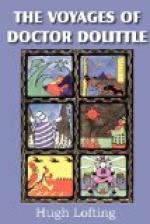The air of our chamber, not having a change in the whole voyage, got very close and stuffy; and for the first two days we all had headaches. But after that we got used to it and didn’t mind it in the least.
Early in the afternoon of the sixth day, we noticed we were climbing a long gentle slope. As we went upward it grew lighter. Finally we saw that the snail had crawled right out of the water altogether and had now come to a dead stop on a long strip of gray sand.
Behind us we saw the surface of the sea rippled by the wind. On our left was the mouth of a river with the tide running out. While in front, the low flat land stretched away into the mist— which prevented one from seeing very far in any direction. A pair of wild ducks with craning necks and whirring wings passed over us and disappeared like shadows, seaward.
As a landscape, it was a great change from the hot brilliant sunshine of Popsipetel.
With the same whistling suction sound, the snail made the opening for us to crawl out by. As we stepped down upon the marshy land we noticed that a fine, drizzling autumn rain was falling.
“Can this be Merrie England?” asked Bumpo, peering into the fog—“doesn’t look like any place in particular. Maybe the snail hasn’t brought us right after all.”
“Yes,” sighed Polynesia, shaking the rain oft her feathers, “this is England all right—You can tell it by the beastly climate.”
“Oh, but fellows,” cried Jip, as he sniffed up the air in great gulps, “it has a smell—a good and glorious smell!—Excuse me a minute: I see a water-rat.”
“Sh!—Listen!” said Chee-Chee through teeth that chattered with the cold. “There’s Puddleby church-clock striking four. Why don’t we divide up the baggage and get moving. We’ve got a long way to foot it home across the marshes.”
“Let’s hope,” I put in, “that Dab-Dab has a nice fire burning in the kitchen.”
“I’m sure she will,” said the Doctor as he picked out his old handbag from among the bundles—“With this wind from the East she’ll need it to keep the animals in the house warm. Come on. Let’s hug the river-bank so we don’t miss our way in the fog. You know, there’s something rather attractive in the bad weather of England—when you’ve got a kitchen-fire to look forward to. . . . Four o’clock! Come along—we’ll just be in nice time for tea.”



